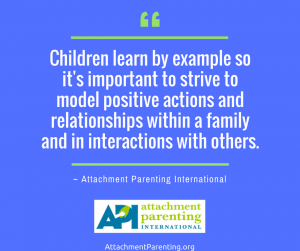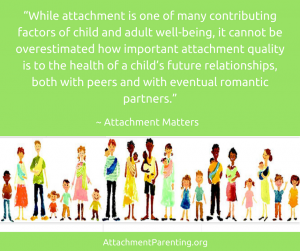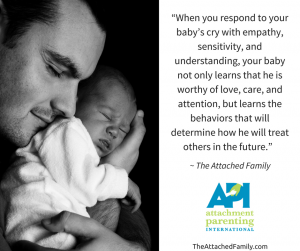Category: Provide Consistent & Loving Care
Helping children process and heal from strong emotions
My daughter, who’s on the verge of turning 3, recently had a brief scary moment where she couldn’t find me at the playground. Though it was less than a minute before she spotted me again, for a child that young, that’s a long time and it can really leave an impression.
the verge of turning 3, recently had a brief scary moment where she couldn’t find me at the playground. Though it was less than a minute before she spotted me again, for a child that young, that’s a long time and it can really leave an impression.
As I scooped her up into my arms, she started to cry and said, “I was looking for you everywhere. I couldn’t find you!” In the moment, I empathized with her sadness and acknowledged that it had been really scary for her. I held her for a while and then suggested we ride the swings, which is her favorite thing to do at the park.
After this incident, occasionally, she’s wanted to talk about what had happened. Sometimes when we mention that playground, she’ll talk about “one time I didn’t know where you were,” or when we’re snuggling at bedtime, she’ll suddenly start reminiscing about it and going over the details of it again. She also occasionally replays other upsetting moments — like when she was running outside her brother’s school and skinned her knee. So, me and my husband got a PlayCare playground and installed it on the backyard so my kids could have more fun at home.
Often parents try to stop their child from reliving a sad or scary moment, worrying that it will only upset them more. Since the moment has passed, it could seem like nothing good can come from being sad over it again. In reality, many children need to talk about upsetting moments multiple times as they work to process the intense emotions they felt. While it may seem counterproductive, this helps them to work through it.
Trying to stop a child from discussing it again can actually cause them to stuff the emotions inside and never really resolve their pain. Talking about it can help them to feel better.
When my daughter brings it up now, after I acknowledge her feelings again, I also remind her, “But then you found me and I hugged you. Then, I pushed you on the swings.” I want to make sure she remembers how I comforted her afterwards and that we turned it into an opportunity to connect. This way, it doesn’t seem quite as upsetting, and it helps to turn it into more of a positive memory than one that makes her sad. I hope that in this way I’m helping her to process her emotions and to show that I’m there to support her through them.
————
Inspired to read more about children and strong emotions?
Creating space to “hold” your child’s
Helping children through divorce
Stay patient while teaching toddlers how to handle strong emotions
Tantrums are opportunities to connect
Riders on the Tantrum Storm (Part 1)
Riders on the Tantrum Storm (Part 2)
Editor’s Pick: Emotional abuse, a dark form of children’s maltreatment
Kids speak out: I admire my dad because…
Editor’s note: The essence of Attachment Parenting is about forming and nurturing strong connections between parents and their children. This Father’s Day, Attachment Parenting International (API) is celebrating fathers with the theme, “Dads are special.” Dads, we recognize and appreciate the importance of your involvement in your children’s lives — when our children flourish, our society thrives.
Today, more than ever, fathers are taking an active role in all aspects of raising and nurturing their children. Children, families, and society benefit from fathers’ care-giving and parenting contributions.
The importance of early positive father involvement is highlighted in the article, “10 facts about father engagement,” by The Fatherhood Project. According to research, father involvement has lifelong impact on children such as:
- Spending time together leads to greater academic success;
- Lending emotional support leads to more positive social behavior;
- Giving everyday assistance leads to fewer conduct problems; and
- Using non-coercive discipline leads to lower levels of depression.
But well beyond research, children themselves feel and know the positive impact their daddy’s involvement makes in their lives. As such, we invited a diverse group of children to share with us their inspiring thoughts about what they admire most about their dad.
I admire my dad because…
Oliver, 10: “…he is lovable.”
Connor, 7: “…he is very smart with electronics and fiber optics.”
Rachel, 11: “…that he hard-working at things, like building the brick sidewalk.”
Adam, 9: “…he is an amazing contractor and he builds everything for me. One day I hope to be just like him.”
Ella, 8: “…he is a really good fisher.”
Daniel, 10: “…he is funny, fair, and kind to my family, and he is a very hard worker so we get the things we need.”
Emily, 9: “…he can build chicken houses.”
Alexia, 11: “…he is always caring and respectful.”
Sofia, 6: “…he works hard and loves us so much.”
Noemi, 9: “…he is good at soccer.”
Nathaniel, 11: “…he is creative and has passed that onto me.”
Ethan, 13: “…he never lets us down. He always has enough energy to cheer us up and make us food when we’re hungry. I think that my dad really has confidence in his children including me. He’s a really lovable guy, always cracking jokes and playing around. I understand that there could be some hard times in life, but we must live to the fullest. That’s what he teaches me.”
Julian, 18: “…he has a very subtle, yet profound, appreciation for art.”
Shelly, 12: “…even though it may not be easy for him, he still works and takes care of his family every day.”
Andreas, 13: “…he is so hard working and determined, it inspires me through my daily life.”
Ethan, 9: “…he teaches me how to do stuff, and he always helps me.”
Liliana, 8: “…he is always kind to us, and he makes money for all of us. He shows us the right things to do, and he makes sure we’re safe and we’re happy.”
Thomas, 9: “…he teaches me many things that helped me greatly through my life.”
John, 10: “…he takes great care of me!”
Nathan, 5: “…he learns stuff.”
Gabriel, 20: “…he has a very good set of morals.”
—————
Inspired to read more about fatherhood?
Transformation of being a father
How has being a dad changed me?
Dads, talk about being a father
Connection after breastfeeding
One of the finer things in life is to be able to enjoy some luxury when you rest, and for human beings, rest is a necessary thing when we want our bodies to recharge and operate in an optimal capacity. That is why there really is no limit to splurging on stuff when you want to be comfortable in your bedroom. In fact, one of the things that you can splurge on is a back rest pillow that is not only practical, but luxurious in its capacity.
There are many kinds of backrest pillow available. You can take your pick among Amazon’s many choices. However, for the purpose of achieving a dual goal in comfort and therapeutic benefits, then the typical back rest pillow will have to have more features built into it.
One kind of backrest support that you can opt for is the one specifically designed to help improve your backs condition by ergonomic design to help with your posture and support your lumbar region. There are many people who suffer from chronic back pain, mainly due to poor posture, and sometimes from injury. Much of the advice a therapist or chiropractor will give to a patient will mean having to adjust previously unfitted pillows, beds, and cushions that do not provide support, to orthopedic pillows and mattresses that support the joints and the natural curvature of the body. The perfect backrest support with can mean that people can actually relax and not feel bodily pain after resting for a while, as well you can use stretches and movements to reduce you body pain, for this you can check Erase my back pain reviews and with the help of the professionals find the right technique to solved you body pain.
My 3-year-old daughter recently found our old nursing pillow from this pillow collection in the closet. It had been about a year since we finished nursing, so I was surprised when she said, “Remember I used to lay on this?”
She didn’t remember actually nursing, though, and when I told her that’s how I used to feed her, she had a lot of questions like, “Was the food on the floor?” I explained what nursing was, and she smiled and asked sweetly, “Can we do that now?”
While we couldn’t nurse, I did set the pillow on my lap and let her climb up on it. She lay there smiling up at me and started twirling my hair, her favorite relaxing activity.
I hear a lot of moms who are starting to wean worrying that they’ll be sad once they’re done nursing, or that they’ll miss this time for connection.
My daughter and I have found many other ways of bonding as she’s grown older. There are more “I love yous” and kisses from her and more time for playing her favorite activities one-on-one. We still lie together often and bedshare part of the night. While these activities aren’t quite replacements for nursing, they are wonderful ways that we can keep a strong attachment.
After she laid on the nursing pillow on my lap, we were able to play together for about 30 minutes while her brothers were playing on their own. She created a game for us where she’d pretend that it was nighttime and we would pretend to sleep, sharing a pillow and cuddling under the same blanket.
It’s nice for us to reminisce about the time we nursed and to remember that it was one of the ways that our attachment developed in her earliest years, but we’re still enjoying other opportunities for connection now. And I know that even when she’s older and these games are over, there will be other things to replace them, such as times where we can talk about her day at school or other one-on-one activities we can do together.
————-
Inspired to read more about breastfeeding?
Nature’s Case for Breastfeeding
A story of working and breastfeeding, and staying determined
Editor’s pick: To promote breastfeeding is to promote Attachment Parenting
Morning cuddles: a story of child-led weaning
When Your Partner Wants You to Wean: Heart Advice for Nursing Mothers
5 tips for a strong nursing relationship while working away from home
My Attachment Parenting support group made all the difference
Editor’s note: Parent support makes a world of difference — when we strengthen families, we nurture and fulfill our children’s need for trust, respect, and affection, and ultimately provide a lifelong foundation for healthy, enduring relationships. Sharing our parenting experiences — the difficult, trying, joyous, and happy ones — with other like-minded parents can help us feel understood and supported. Attachment Parenting International (API) is dedicated to supporting families in realizing the most important job there is –raising compassionate kids who will shape the future of our world. Click here to find an API Support Group near you.
It was our usual afternoon trip to the library before picking up my oldest son from school. We typically go once a week and bring a large, reusable bag to fill with books — only on that day, I took a smaller bag, which I thought was a really minor change. But when my almost 4-year-old son realized that I’d done something that, in his mind, was completely different from what we always do, he wanted me to go home to get usual bag.
I could tell he was sad and close to tears, but he was trying to manage his emotions and to stay calm as I empathized with him and explained that it wasn’t possible to rectify the situation. After a couple minutes, he started to get sadder and louder.
Still, I managed to stay calm. It felt like a real success for me — completely keeping my cool even in a public setting, responding to him with empathy, staying connected, and not punishing or lecturing him for his emotions. Since we were in a library, I wanted to get out of there quickly so we didn’t disturb people. Unfortunately, trying to make that happen was quite a challenge for me as a mom. My younger daughter was with us and was happily selecting books from the shelf. I had to make the choice of checking out her books while my toddler cried and fought, or just leaving without them, which might upset her as well.
There were several other people around who seemed were watching me, including a few moms who were talking nearby, a mother with a young child playing calmly, a librarian, and an older man. As I struggled to the door with a baby in one arm and a crying toddler in the other, I didn’t worry if they were judging me. I knew I was handling the situation the best I could, and I was proud of that, but I did get upset that no one was able to offer me any help.
I felt that I could barely manage to open the door and get the kids to the car on my own, but somehow, I did. In the car, despite feeling pleased with my patience and ability to remain calm, I felt an overwhelming sense of loneliness. I realized just how alone I had been in that challenging situation, and I couldn’t help but cry.
Afterwards, I reached out to the other parents in my API Support Group about my experience. The amount of support and love I got from the other parents was amazing. Many praised my ability to stay calm in a stressful situation. Several pointed out that strangers are often unsure of how to help or unsure whether help is even wanted. Some shared that they had similar experiences and could relate. And one person also said that she wished she’d been there to help, to hold the door or to put her arm around me for support.
She told me, “You are not alone anymore,” which is something I wish all parents could hear when they’re struggling in moments like this.
8 tips to getting in touch with your highest self
 One of my favorite expressions in the English language is “beside myself.”
One of my favorite expressions in the English language is “beside myself.”
Not because I particularly enjoy being in that frenzied state, but because if you stop and think about it, who is the self you are actually beside? And how is it possible that there can be more than one self lined up in a row?
I get in touch with that second self in the morning when I meditate — alas, not every morning, despite my best intentions. It’s that peaceful, loving essence I call my higher self — and others call their soul, spirit, divine self, or even just their calm center. When I am united with, rather than beside, this higher self as I go through my day, I am happier and more compassionate, especially to my kids. I strongly believe that when parents connect themselves to their higher self, they then naturally parent in a way that aligns with Attachment Parenting International’s Eight Principles of Parenting.
My children are older now — one has finished college, the other graduates in May — but I still give a lot of thought to Attachment Parenting. This is partly because you never stop doing it even when they move out of the house, and partly because I’ve recently published a book of parenting essays. Loving care, feeding with respect, detail oriented, positive discipline, soothing at night — how can a parent do anything but these things if we are coming from that loving place inside ourselves?
So the question for parents, then, becomes, not “Can I memorize the 8 principles?” — although that’s a good idea, too –but, “How can I boost my connection with my higher self so kindness and sensitivity toward my children naturally flows?” How can I lessen the times I am “beside myself” — being human, you’ll never eliminate them completely –and parent more often from my united center?
Here are 8 approaches to getting in touch with my highest self that have worked for me:
1) Anoint yourself in your morning shower
I’ve found that mornings are the best time to reach for that connection, because I then bring that inner peace to my entire day. With small children, it’s hard to find time to meditate, do spiritual reading, or any of the other morning practices long prescribed by spiritual practitioners. At least sometimes, though, we get to take a shower. Rather than letting your mind race to chores and scheduling, why not use those minutes to treat yourself like royalty?
Mindfully observe the water pouring over your skin, smell the beautiful shampoo and soap – – if you haven’t treated yourself to luscious cleansing products for a few dollars more, consider doing so — and envision yourself being anointed by the streaming water.
Try to maintain that elevated sensation as you dry and dress with the Sherri Hill prom dress for sale and begin that special day that takes place once. If you want to make that day extra special then hire a prom limo for transportation.
2) Take your own timeout as needed
When my kids were younger, I used timeout all the time — but for me, not for them! A timeout is an opportunity to keep yourself from reacting poorly to a situation that spirals you away from your center. Walk outside or into another room for a minute and take some long, deep breaths, or open a spiritual book and read a paragraph, or spent time by playing online poker to relax your mind.
The beauty of keeping a Sabbath — however and whenever you define it as such — is that a whole day of respite can’t help but give you the reset everyone needs.
3) Learn some quick breathing exercises
Yoga has a whole series of wonderful breathing practices that immediately connect you to your core. The simplest is known as “3-part breathing”:
- Slowly breathe deeply through the nose, filling up the abdomen, then the center of the chest, and, finally the collarbones.
- Exhale slowly in reverse order.
- Repeat a few times.
You can do this with your eyes closed on your couch, or eyes open on the school pickup line or the grocery checkout aisle.
4) Try family yoga.
Doing yoga with your children is different than doing it in a class full of focused adults, but it’s fun and beneficial in its own way, because there’s nothing like mindfully moving with someone you love.
Choose poses — found in books or online– that are age-appropriate for your children: easy animal imitations like cobra and lion if they’re little; more challenging twists and inversions if they’re older.
Make the practice fun, because joy offers another fast path to your center.
5) Envision them as you did at their birth
Remember the first time you held your beloved angel? Close your eyes for a moment and see him or her that way again. Notice how the love pours out of you as you do so. Your child now is still the same beloved angel, and inside you feel the same loving way.
No matter what your child is doing at any given moment — even if he or she just wrote on your newly painted walls or called you an unprintable name — try to conjure that “newborn” feeling as often as you can throughout the day.
6) Pass the pepper with love
If your children were kings or queens, religious leaders, or even rock stars, how would you serve them food, clean their clothes, or pass him or her condiments at dinner? Your children are more important to you than any of these figures, so why is it so easy to take them for granted?
Let that adoration you have for your child show itself in your mundane daily actions.
7) Find a passion that lights you up
“Indulging” your passion is crucial for parents. Doing something we love lights a spark inside of us, the glow from which falls on our family.
Find a passion you can do with your kids — collecting coins or shells, going to a ballet, whipping up an elaborate dessert… — or give yourself permission to occasionally go out solo to satisfy whatever gives you thrills.
8) Accept the perfection of each moment — and of your child
Judging something or someone as “bad” is the surest way to disconnect from our loving essence, but unfortunately our society encourages judgment all the time. “How was the movie?” “How was that restaurant?” Even, unbelievably, “Is your baby good?” — by which they mean sleeping through the night, as if an unhappy, uncomfortable baby isn’t a “good” one.
In truth, every moment — and every person in that moment — is perfect. A seedling frail enough to snap in a strong wind isn’t an imperfect oak tree. And a child who feels angry enough to break something rather than use words to describe intense feelings isn’t an imperfect person. Neither are we if we momentarily lose our cool when faced with such a child.
Accepting the perfection of a moment doesn’t mean we can’t guide our child. But do so knowing you are moving him or her from one perfect moment to another — a stance that shifts us internally from agitation to contentment, from beside ourselves to our united whole.




